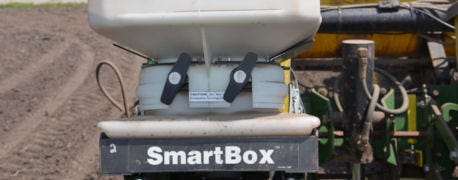
A farmer needed some corn to finish planting. He was out of all the seed he had ordered. His seedsman found him quality seed, but there was just one catch. He had been planting GMO corn with both corn borer and rootworm control traits. The seed he could get was glyphosate and Liberty-Link resistant, and has corn borer resistance, but it was not resistant to rootworm. There was a history of rootworm feeding on first year corn on non-traited hybrids in his area.
Fortunately, he had insecticide boxes, the Smart Box system, on his planter. It prevents exposure to insecticides because the insecticide comes pre-loaded in a container, making a sealed system.

Still a niche: Soil-applied insecticide is still the best choice in some situations.
But his first question was if seed treatment on the seed would control the larvae and he could skip the insecticide.
Most treatments of either Poncho or Cruiser are available at the 250, 500 and 1250 rate levels. The 1250 level is rated for corn rootworm control, although university tests in the Midwest over the past several years have shown that control is more inconsistent than with soil-applied insecticides. It is also less effective if there is strong rootworm pressure.
Related: Corn Rootworm Creates Challenges For Continuous Corn
In this case the decision was made for the farmer. When he checked the tag and read closely, he saw that the seed treatment was Cruiser 250 as the insecticide ingredient. He knew that wouldn't stop rootworms. So he applied Aztec soil-applied insecticide in Smart Boxes instead.
The Smart Box system is equipped with its own small display monitor that mounts in the cab. It sounds an alarm if a row is not applying insecticide properly. It's another box in the cab, one farmer says. But it's handy to know if a problem develops and needs attention. Sometimes it will beep if flow on a row in interrupted by a clump, then it is OK again in most cases.
About the Author(s)
You May Also Like




